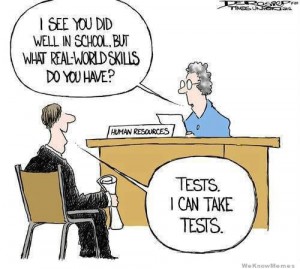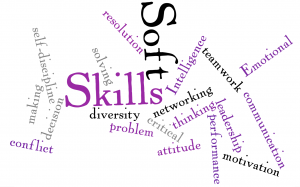 Adolescence is a prime stage of life in which significant changes in physical and mental development occur. The development that takes place at this time can affect the health of an individual across his or her lifespan. Recently implemented educational policies and reform efforts have led schools to focus on building an academic curriculum that revolves around higher standards and increasing academic achievement on standardized tests. In effect, this has increased expectations for students’ academic performance. In addition, parent involvement has increased along with the competition for admission to colleges and universities across the country. As a result, adolescent students experience more stress and are more focused on their future than adolescents in previous decades. According to a large national study led by Jean M. Twenge (2017), author of “IGen: Why Today’s Super-Connected Kids are Growing Up Less Rebellious, More Tolerant, Less Happy – and Completely Unprepared for Adulthood,” adolescents today spend less time engaging in adult-like activities. This includes driving, dating, working for pay, engaging in sexual activity, and trying alcohol. The findings suggest that these environmental factors have contributed to a slower developmental trajectory from adolescence to adulthood (Twenge, 2017).
Adolescence is a prime stage of life in which significant changes in physical and mental development occur. The development that takes place at this time can affect the health of an individual across his or her lifespan. Recently implemented educational policies and reform efforts have led schools to focus on building an academic curriculum that revolves around higher standards and increasing academic achievement on standardized tests. In effect, this has increased expectations for students’ academic performance. In addition, parent involvement has increased along with the competition for admission to colleges and universities across the country. As a result, adolescent students experience more stress and are more focused on their future than adolescents in previous decades. According to a large national study led by Jean M. Twenge (2017), author of “IGen: Why Today’s Super-Connected Kids are Growing Up Less Rebellious, More Tolerant, Less Happy – and Completely Unprepared for Adulthood,” adolescents today spend less time engaging in adult-like activities. This includes driving, dating, working for pay, engaging in sexual activity, and trying alcohol. The findings suggest that these environmental factors have contributed to a slower developmental trajectory from adolescence to adulthood (Twenge, 2017). 
The literature describes an evolutionary-psychology theory (life history theory) which predicts that this slower period of development is due to a more secure, resource-rich environment. In previous decades, life expectancy, college enrollment, and average age when reproduction takes place were lower. Additionally, family sizes were higher which suggested that there was less parental investment in each child. Nowadays, adolescents are developing according to the current culture they are surrounded by. As changes in the culture have taken place, including the increase in parental involvement, increase in issues relative to liability and risk and increased competition for quality education and jobs, expectations for adolescent students have changed as well. Students know they are on the track to success as the current culture perceives it to be; they expect that they will graduate from high school, complete four years of college, participate in an internship or a graduate program, enter into the workforce, etc. In essence, these students know that they are not likely to have adult-like responsibilities until later in their 20’s (Bahrampour, 2017).
The research clarifies that the brain responds to environmental stimuli; perhaps the current environment is causing a delay in adolescents’ cognitive development.
 Cognitive skills are developed throughout the adolescent period that help one to effectively and positively respond to environmental threats. Research confirms that mental health issues are at a high for 21st century adolescents. Statistics specifically show high levels of stress, anxiety and depression (American College Health Association, 2017). It is seemingly apparent that the educational changes and social trends previously described have played a role in this. In addition, the excessive use of technology has also affected adolescent brain development. Educators have a responsibility to prepare students for not only academic success, but for college, careers, and life outside of the classroom. Essentially, a good educational system will adequately prepare all students for success in adulthood.
Cognitive skills are developed throughout the adolescent period that help one to effectively and positively respond to environmental threats. Research confirms that mental health issues are at a high for 21st century adolescents. Statistics specifically show high levels of stress, anxiety and depression (American College Health Association, 2017). It is seemingly apparent that the educational changes and social trends previously described have played a role in this. In addition, the excessive use of technology has also affected adolescent brain development. Educators have a responsibility to prepare students for not only academic success, but for college, careers, and life outside of the classroom. Essentially, a good educational system will adequately prepare all students for success in adulthood.
When students are constantly competing for educational and financial success, and their self-worth is determined in part by others’ perceptions from social media posts, they are constantly seeking approval
and fulfillment from external sources.  Based on this research, the U.S. educational system may be lacking in the sense that adolescents are not prepared with the proper interpersonal and intrapersonal skills that are needed to be able to conquer the challenges that life throws at them. This includes soft skills, resiliency, leadership qualities, self-awareness, and much more. It is absolutely crucial for the educational system to take initiative and focus more on the concept of holistic development; without this, the academic success that students work so hard for to get to the next level, is not really worth much at all.
Based on this research, the U.S. educational system may be lacking in the sense that adolescents are not prepared with the proper interpersonal and intrapersonal skills that are needed to be able to conquer the challenges that life throws at them. This includes soft skills, resiliency, leadership qualities, self-awareness, and much more. It is absolutely crucial for the educational system to take initiative and focus more on the concept of holistic development; without this, the academic success that students work so hard for to get to the next level, is not really worth much at all.
References
American College Health Association. (2017). ACHA-NCHA II: Reference Group Executive Summary Fall 2016. Retrieved from American College Health Association: http://www.acha-ncha.org/reports_ACHA-NCHAIIc.html
Bahrampour, T. (2017, September 19). Not drinking or driving, teens increasingly put off traditional markers of adulthood. Retrieved September 19, 2017, from https://washingtonpost.com/local/social-issues/neither-drinking-nor-driving-more-teens-are-putting-off-traditional-markers-of-adulthood/2017/09/18/b46027a0-93fl-11e7-8754-d478688d23b4_story.html?tid=ss_mail&utm_term=.a69450b9d1b0
Twenge, J. M. and Park, H. (2017), The Decline in Adult Activities Among U.S. Adolescents, 1976–2016. Child Dev. doi:10.1111/cdev.12930
Greetings Alex,
I most certainly agree with your post and the concern with youth finding their self worth from external factors such social media. More awareness is needed for educators and parents to increase their knowledge on how self-awareness is lacking in our youth and the impact it can have on them as they become adults. To assist with this effort a great resource to look into is the Collaborative Academic for Social Emotional Learning (CASEL.org). The site provides great tools in action that can be implemented in various settings that will allow for educators and parents to start the development of that self-worth mentioned in your post. Thanks for shinning a light on this concern . Awesome job sharing!
-Cortney R.
Ali, I enjoyed reading your post. I think it is such an important issue in our society that is unfortunately not targeted enough. Your blog is a beautiful sequence to Cortney’s blog (focuses on teaching social-emotional skills in schools), emphasizing the importance of learning skill sets at an early age to prevent future problem behaviors. I think you hit the nail on the head; I agree regarding many young adults not being ready for adulthood. Perhaps, our teaching approaches are not up to date with our society or culture’s needs. Our students have different needs and requirements to gain knowledge compared to the past.
I like what you said about the importance of developing cognitive skills. We were discussing this as a faculty this week. I especially liked the accompanying picture and though humorous, I think that it speaks volumes. I feel that a lot if teachers are still teaching to pass the test and students and parents are accepting of this for the sake of college admissions. That being said, Colleges are increasingly looking for the more well rounded student.
Interesting post, Allie. Although I certainly agree that young adults are not prepared to enter adulthood, I was surprised to see that research indicates they are not engaging in adult-like behaviors (i.e. sexual activity and alcohol to be more specific). I thought you brought up some great points and see the benefit in making a bigger commitment to preparing student for life after high school.
This also makes me think of conversations I have had with Charlene. Young adults’ brains are still developing and educators need to have a better understanding of cognitive development. Are we prepared to educate? I don’t necessarily know the right answer to that question, but think we need to place more emphasis on cognition and motivation to better understand behaviors.